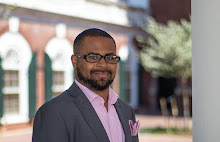Wounded Lover: Part 2 of my "Meet the Faith" review
Last Sunday's episode of "Meet the Faith" is a taste of an ongoing tension two branches of Zion that rarely get together and discuss what's going one in America. Each branch draws the boundary lines in what's really wrong in America. I am a lover of both but they are like two brides that don't talk to each other that often.
In Mark Noll's Scandal of the Evangelical Mind, he describes in himself as a "wounded lover" in relation to American evangelicalism. I haven't read the book yet but he basic thesis is that evangelicalism suffers from a bout of anti-intellectualism. I would like to borrow this moniker and use it to describe myself as a "wounded lover". I have two loves that don't seem to get along when invited to a party: American Evangelicalism and the Black Church.
Now many researchers/scholars would argue that the largest segment of the evangelical tradition come from the African American community. But for many African American Christians, the word evangelical carries a very negative connotation. The word connotes complicity with the status quo. The Black Church has been a "prophetic voice" against systemic oppression and poverty. Historically many in the white Evangelical community haven't helped in the fight for civil rights. Some of the most central figures in the so-called Religious Right openly promoted racial segregation in public schools, churches, and marriages. Currently the Black Church doesn't generally align itself with the Republican party, while the white Evangelical Church generally does.
The Black Church is very diverse in itself. Some scholars include any non-Christian traditions i.e. Islam, Yoruba within its definition. The Black Church features evangelicals, Catholics, mainline Protestants, Holiness, and Pentecostals/Charismatics. The Black Church has been a central socio-political citadel since its inception during the late 1700s. The Black Church was the advocate for the people. It was a meeting place for worship and social change strategy-formation. Today the Black Church is experiencing a civil war. With the upsurge of black megachurches, the so-called "prosperity gospel", and the taboo subject of homosexuality within the Black Church being challenged, the Black Church is in a battle to keep its social relevance.
The stereotypical preoccupation with my two loves are as follows: mainstream Evangelicalism is preoccupied with traditional marriage and abortion, the Black Church elimination poverty, reforming public school education and improving the health care system, and advancing black economic empowerment. One branch primarily promotes private traditional morality while the other promotes social justice or public government morality. When will we will ever talk with one another, pray with one another, and most of all love one another?
Saturday, June 30, 2007
Subscribe to:
Post Comments (Atom)


No comments:
Post a Comment